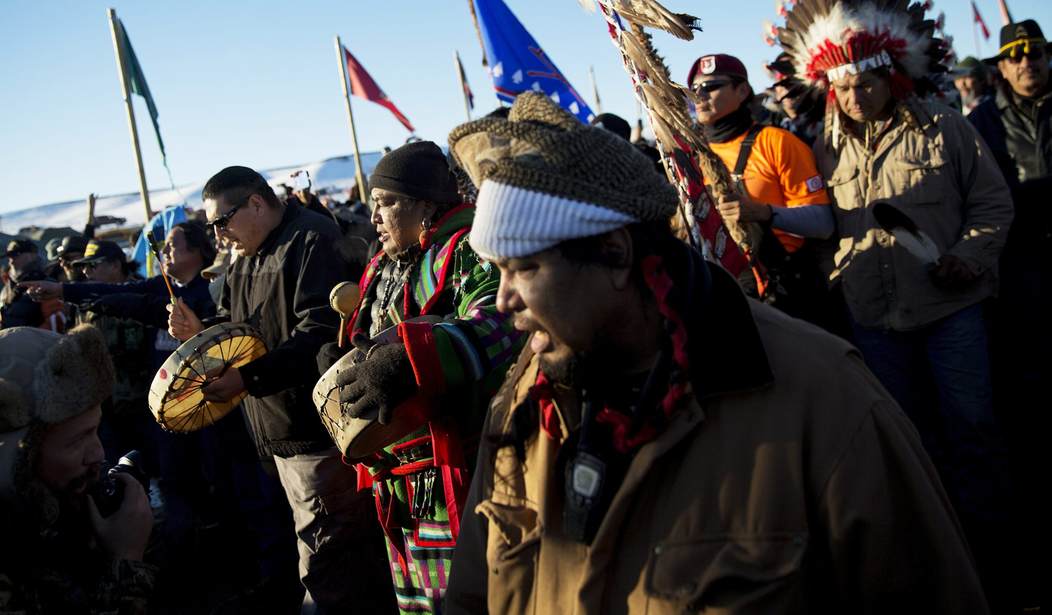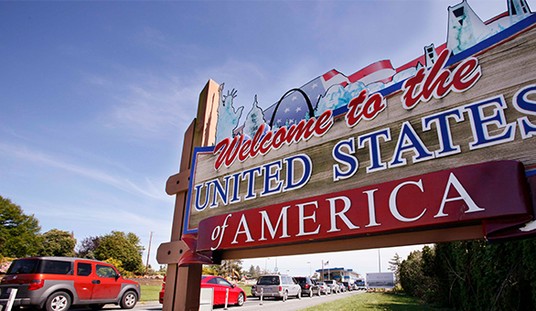The United Nations’ special rapporteur on the rights of indigenous peoples wrapped up a fact-finding mission to the United States warning that Native American rights are not being respected in energy production decisions and that oil projects put native women and children at risk of sex trafficking.
In her end-of-mission statement today released by the UN High Commissioner for Human Rights, Victoria Tauli-Corpuz detailed her trip, which began Feb. 22 and took her to Washington, D.C., New Mexico, Arizona, Colorado and North Dakota. She met with officials from departments involved in the Dakota Access Pipeline (DAPL) process, including the Army Corps of Engineers and North Dakota’s governor, as well as staff of pipeline supporter Sen. John Hoeven (R-N.D.). She also met with numerous Native American tribes.
Information gathered on her trip will be compiled into a report that will be presented at the UN Human Rights Council in September.
“From my conversations with people throughout Indian Country, I have learned that many of the complex issues that Native Americans face in the energy development context today are rooted in a long history of land and resource dispossession,” Tauli-Corpuz said in her initial observations. “In particular, the policy of allotment implemented by the Dawes Act in 1887 continues to have significant impacts on the development of energy resources throughout Indian Country. The different types of land ownership that exist within reservation boundaries make consistent resource management and regulatory control difficult and complex.”
She added that state governments “may assert tax and regulatory authority over energy development within tribal lands” while “the Bureau of Land Management and other federal agencies approve energy projects on lands within reservation boundaries without the consent or input of the tribal government.”
“The regulatory regime has failed to ensure effective and informed consultations with tribal governments,” she wrote. “The breakdown of communication and lack of good faith involvement in the review of federal projects has left tribal governments functionally unable to participate in consequential dialogue with the United States on projects affecting their lands, territories, and resources.”
Implementing “best practices about tribal consultation will ensure a more positive and profitable outcome for all stakeholders concerned,” the special rapporteur argued.
“Many indigenous peoples in the United States perceive a general lack of consideration of the future impacts on their lands in approving extractive industry projects in particular, and a lack of recognition that they face significant impacts from development of not just their own, but neighbouring resources as well. In the context of the Dakota Access Pipeline, the potentially affected tribes were denied access to information and excluded from consultations at the planning stage of the project. Furthermore, in a show of disregard for treaties and the federal trust responsibility, the Army Corps approved a draft environmental assessment regarding the pipeline that ignored the interests of the tribe,” Tauli-Corpuz continued, adding, “Sadly, I found the situation faced by the Standing Rock Sioux Tribe is shared by many other indigenous communities in the United States, as tribal communities nationwide wrestle with the realities of living in ground zero of energy impact.”
She stressed that the “goal of tribal consultation is not simply to check a box, or to merely give tribes a chance to be heard,” but “rather, the core objective is to provide federal decision makers with context, information, and perspectives needed to support informed decisions that actually protect tribal interests.”
The UN official also expressed concern about “the criminalization of indigenous peoples asserting their right to protest” against DAPL.
Tauli-Corpuz said she was “deeply concerned” about President Trump’s order expediting the pipeline as “Indian lands represent twenty percent of fossil fuel energy in the United States, and possess an even greater percentage of renewable energy potential” and “the ability for indigenous people to protect their sacred places is severely restricted by the United States legal system.”
She also wrote that the oil shale boom in the Bakken fields of North Dakota coincided with “a dramatic increase in violent crime and an incredible increase of human trafficking of Native women and children.”
“As a direct result of outside development, the entrance of transient workers with no ties to the community, who can for the most part not be prosecuted for their criminal acts that occur on the reservation creates an unsafe and unstable environment for families on the reservation,” the UN official said. “…Tribes informed me that the oil and gas leasing approvals undertaken by the Bureau of Indian Affairs should but do not adequately consider the safety and welfare impacts on native women and children of extractive industry projects.”
She urged a “program of reconciliation” between tribes and the U.S. government that “would acknowledge the historical wrongs inflicted upon indigenous peoples in the United States and confront systemic barriers that prevent the full realization of indigenous peoples’ rights.”
The State Department, which traditionally comments on United Nations matters, did not issue a statement on Tauli-Corpuz’s trip and has not held a press briefing yet in the Trump administration.
Last week, Standing Rock Sioux Tribe chairman Dave Archambault II blasted the White House assertion that it has been in constant contact with the tribe regarding the pipeline project as “absolutely false.”
“We repeatedly asked for meetings with the Trump administration, but never received one until the day they notified Congress that they were issuing the easement. I was on a plane to Washington, D.C. when the easement was issued. It was an insult to me and to the Tribe,” Archambault said. “I cancelled the meeting upon hearing this news. We have since filed a lawsuit for the immoral and illegal issuance of the easement and suspension of the environmental impact study.”
The Standing Rock Sioux Tribe is promoting a Native Nations march on Washington beginning with lobbying Capitol Hill on Tuesday and culminating with a march from the National Mall to the White House on Friday to “make our demands to the new administration.”
“We ask that you rise in solidarity with Indigenous Peoples across the world and demand that Indigenous Rights be respected,” the tribe said in a statement. “This is not about one tribe but all Native Nations.”









Join the conversation as a VIP Member